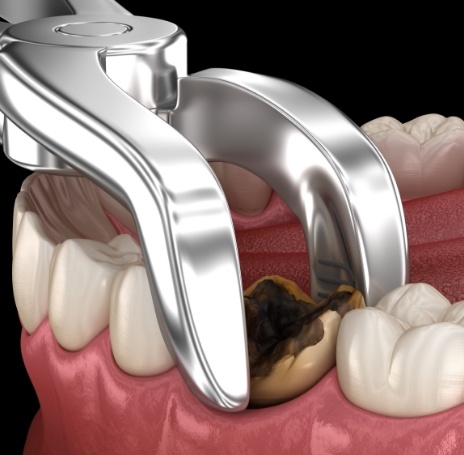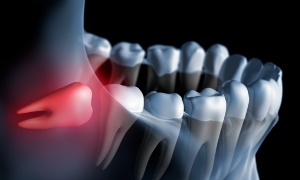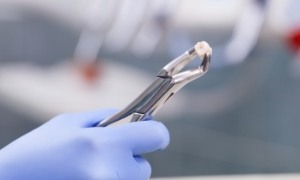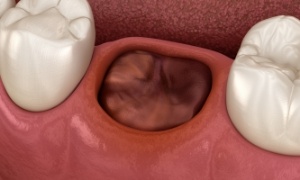Tooth Extractions Rock Hill
Keeping Your Smile Healthy

It’s always better to preserve your natural teeth with restorative dentistry whenever possible, but sometimes an extraction is the only way to keep the rest of your mouth healthy. Drs. Ross and Sourlis will make sure the extraction procedure is performed in a gentle, compassionate manner. If you’re suffering from a severe toothache or another condition that might mean a need for tooth extractions in our Rock Hill, SC dental office, contact us today.
Why Choose Ross & Sourlis Family Dentistry of Rock Hill for Tooth Extractions?
- Same-Day Emergency Appointments
- Lifelike Tooth Replacement Options
- State-of-the-Art Technology
Do I Need a Tooth Extraction?

A tooth extraction can be performed for various reasons. It’s commonly done when there is a tooth that has experienced advanced decay and can’t be repaired; at that point, it needs to be removed so that the infection doesn’t spread. Similarly, removal is necessary when the tooth has been physically injured to the point where a crown can’t save it.
Sometimes, if there’s not enough room in the mouth, an extraction is needed to prepare for an orthodontic treatment. Also, if your child has had their baby teeth for too long, an extraction can make room for the adult teeth.
The Process of Removing a Tooth

The process of removing a tooth is usually straightforward. First, we numb your mouth with a local anesthetic so you do not feel any pain during the procedure. In some cases, we also administer sedation.
Once you are comfortable, we use a tool called an elevator to gently lift the tooth out of its socket. Next, we grip the tooth with forceps and rock it back and forth in order to break the connective tissues that are holding it in place.
After the tooth is out of your mouth, we carefully clean the socket and use gauze to control any bleeding. Finally, you get to go home and begin the recovery process.
Of course, some tooth extractions are more complex than others. If a tooth is impacted (stuck beneath the gums) or there are other special circumstances, the removal procedure might necessitate that we make incisions in the gums or break the tooth into pieces.
Different Types of Tooth Extractions

Typically, if there’s only one affected tooth that’s easily accessible, a simple extraction can be performed with forceps and a device called an elevator. That said, there are a few other forms of this procedure.
Wisdom Tooth Extraction

Wisdom teeth usually need to be extracted because there’s not enough room in the mouth for them to erupt, causing them to become painfully stuck in the jawbone. These third molars can be removed if they pose a threat to your oral health; you might also choose extraction as a precautionary measure. This procedure requires us to make small incisions in your gums, and we might need to break the wisdom teeth into pieces before removing them. We will use an appropriate form of sedation so that you remain relaxed during this process.
Multiple Tooth Extractions

If you need to get multiple teeth removed at once, we can help walk you through the procedure. We will also help you start planning ahead for replacing your teeth with dental implants, dentures, or another restoration.
Tooth Extraction Site Preservation

Dental implants are generally considered the best solution for missing teeth since they can replace the tooth’s root structure. Unfortunately, since tooth loss usually leads to jawbone deterioration, your jaw may not be able to support the implant posts once they’re ready to be placed. It’s possible to avoid this issue with extraction site preservation; this involves the placement of grafting material to keep the bone around the missing teeth strong and thick enough to receive dental implants later.
Post-Operative Care for Tooth Extractions

Our team will give you detailed post-operative instructions to help you enjoy a smooth recovery while your mouth heals from your tooth extractions. We might tell you to:
- Bite down gently on a piece of gauze to manage bleeding.
- Get plenty of rest for at least a few days. During that time, you should avoid strenuous physical activity.
- Use painkillers as necessary.
- Apply ice to minimize swelling.
- Keep your head propped up on pillows when you are resting.
- After the initial 24 hours, begin regularly rinsing your mouth with warm salt water. Simply dissolve a teaspoon of salt in a cup of water and gently swish with the solution for about 30 seconds.
- Do not smoke or use a drinking straw. These activities increase the risk of a complication known as dry socket.
- Eat a diet of soft, nutrient-rich foods. Most people can resume their normal eating habits within 1 – 2 weeks after an extraction.
- Call our team if you have questions or concerns during your recovery.
- Attend all follow-up appointments so we can provide tooth replacement or other services as necessary.

